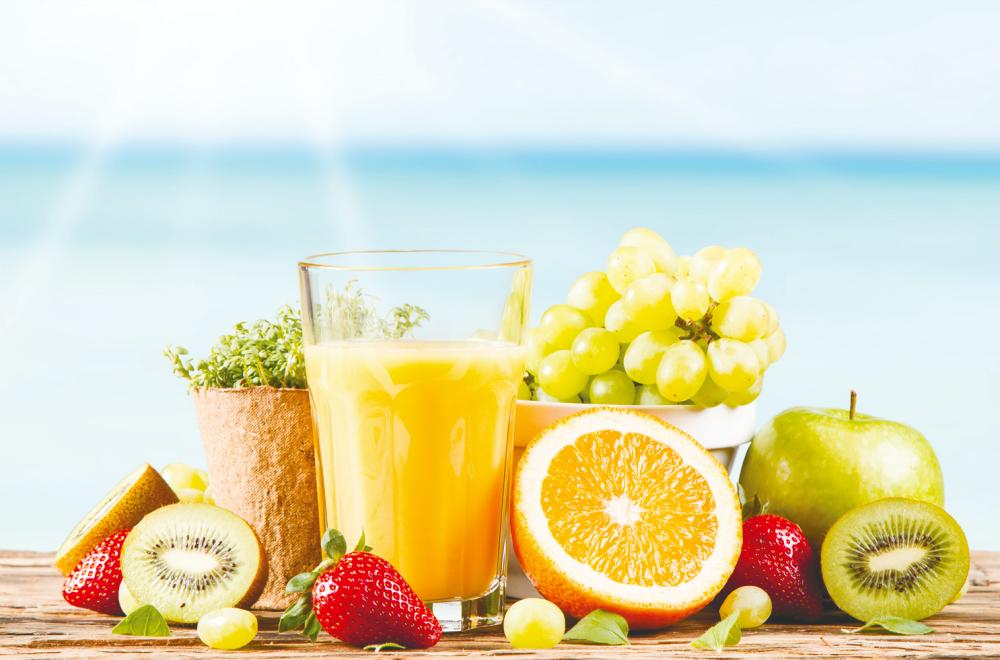IT’S no secret that children (and some of us adults) love fruit juice. Many of us grew up drinking fruit juice or fruit drink concentrates like Ribena, and parents often think 100% fruit juice is healthy. But is it really?
One of the main reasons some people consider fruit juice as unhealthy as sugary soda is the sugar content of these beverages. You see, we often like the taste of fruit juice because it’s a sweet drink. But it’s no secret that sweet often means more sugar, even if it’s natural sugar.
Both soda and 100% fruit juice contain around 110 calories and 20–26 grams of sugar per cup (240 ml). Think about whole fruits that are sweeter – they have more natural sugars that make them taste sweet. Same goes for those 100% fruit juices, which may not have any added sugars. Too much sugar of any kind isn’t healthy.
Because of this, fruit juices are increasingly being seen as a junk food, and consumption is falling. However, fruit juice should not be cut entirely from our diets. Instead, nutrition experts are encouraging people to read the labels and seek out pure fruit juices, instead of drinks made from fruit concentrate or which are “fruit-flavoured”.
Numerous studies have found that adults who drink pure juice were at a lower risk of obesity and had better insulin sensitivity. In addition, pure fruit juice contains the same range of health-promoting chemicals as intact fresh fruit.
In a world where few people manage to consume the recommended daily diet of five portions of fruit and vegetables a day, this convenience can make a huge impact in nutrition.
Yet despite these benefits, several pressure groups and other organisations still suggest that juice should not be part of our diet. But their concerns rely on an analogy with sugar-sweetened fizzy drinks, and confusion over what a fruit juice actually is.
The fear is that because fruit juice contains naturally occurring sugar, it increases the risk of obesity. Although fruit juice does contain sugar it should not be viewed as similar to sugar-containing drinks.
One 2014 study published in PLos One found that drinking sugar-sweetened fruit juice increased the risk of diabetes, while drinking pure fruit juice did not. Another, published in Pediatrics in 2017, showed that while sugar-sweetened drinks increase the weight of children over six years, pure fruit does not.
Juices contain many health-promoting nutrients – such as vitamin C, polyphenols and carotenoids – that occur only to limited extents in sugar-sweetened drinks. Vitamin C, in particular, has been associated with reduced blood pressure, lower risk of heart disease and a better life expectancy for men.
Polyphenols – which gives fruit its red, purple and blue colours – have antioxidant, anti-inflammatory and anti-viral properties. One study on flavonoids (a type of polyphenol) found that high intake cuts the risk of premature death by a quarter. And intake of anthocyanidins – another polyphenol – reduces the risk of developing diabetes.
Finally, carotenoids (responsible for orange, yellow and red colourings) have been associated with lower cancer risks. Studies have linked them with a lower risk of developing oral and laryngeal cancer. Similarly, greater levels of carotenoids in the blood have been related to a reduced rate of breast cancer.
So what does all this news mean for us juice lovers? Simply put, you should only drink pure fruit juices, but in moderation. The danger is that we tend to consume more of fruits when they are in liquid form, and the increased amounts of natural sugars may negate all the healthy benefits we would otherwise obtain from them.
Otherwise, it’s perfectly fine to enjoy your daily dose of fruit juice, whether at breakfast or during the course of the day as part of a healthy diet. Be sure to alternate juices with whole fruits and vegetables as well, for some variety in your healthy diet.









